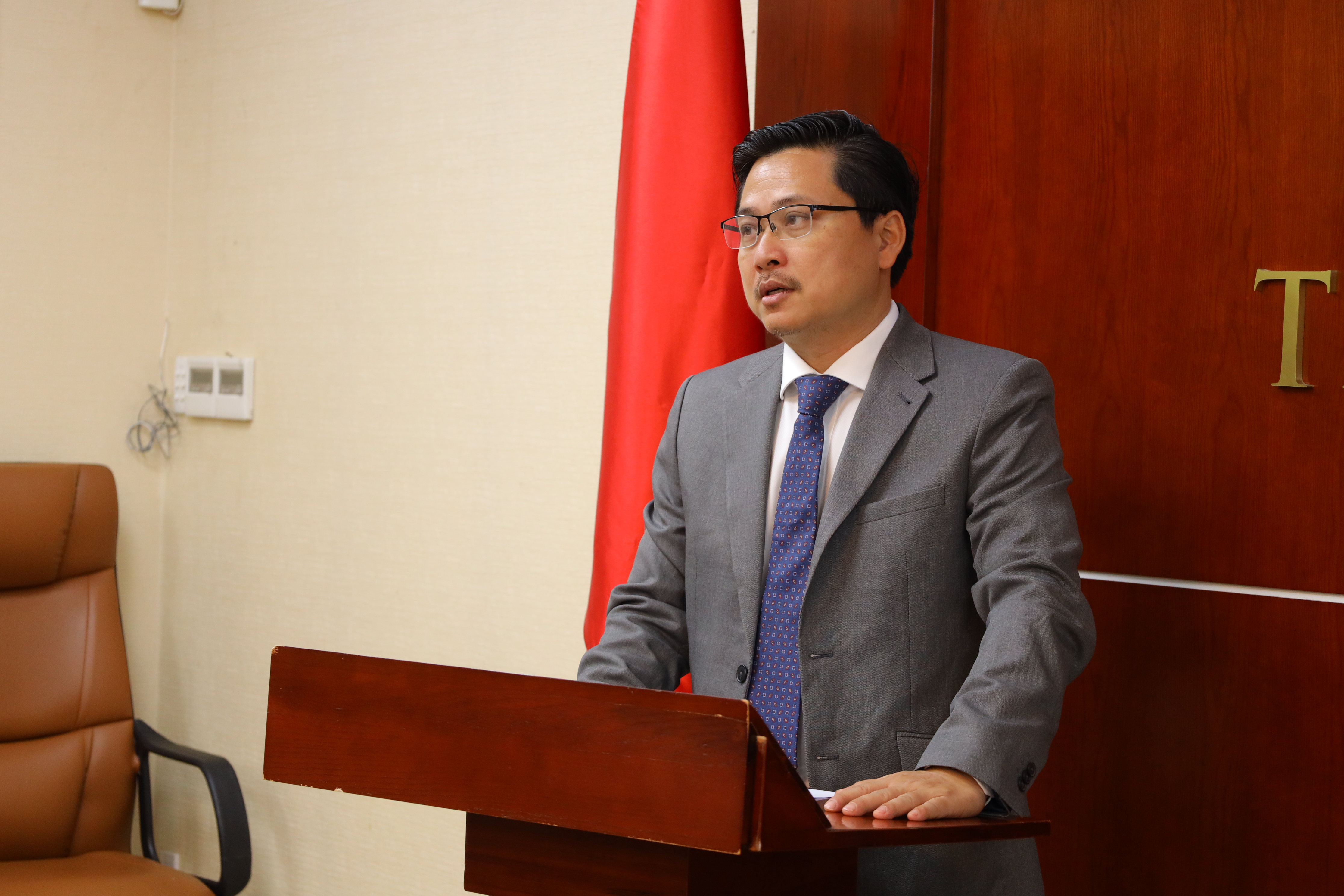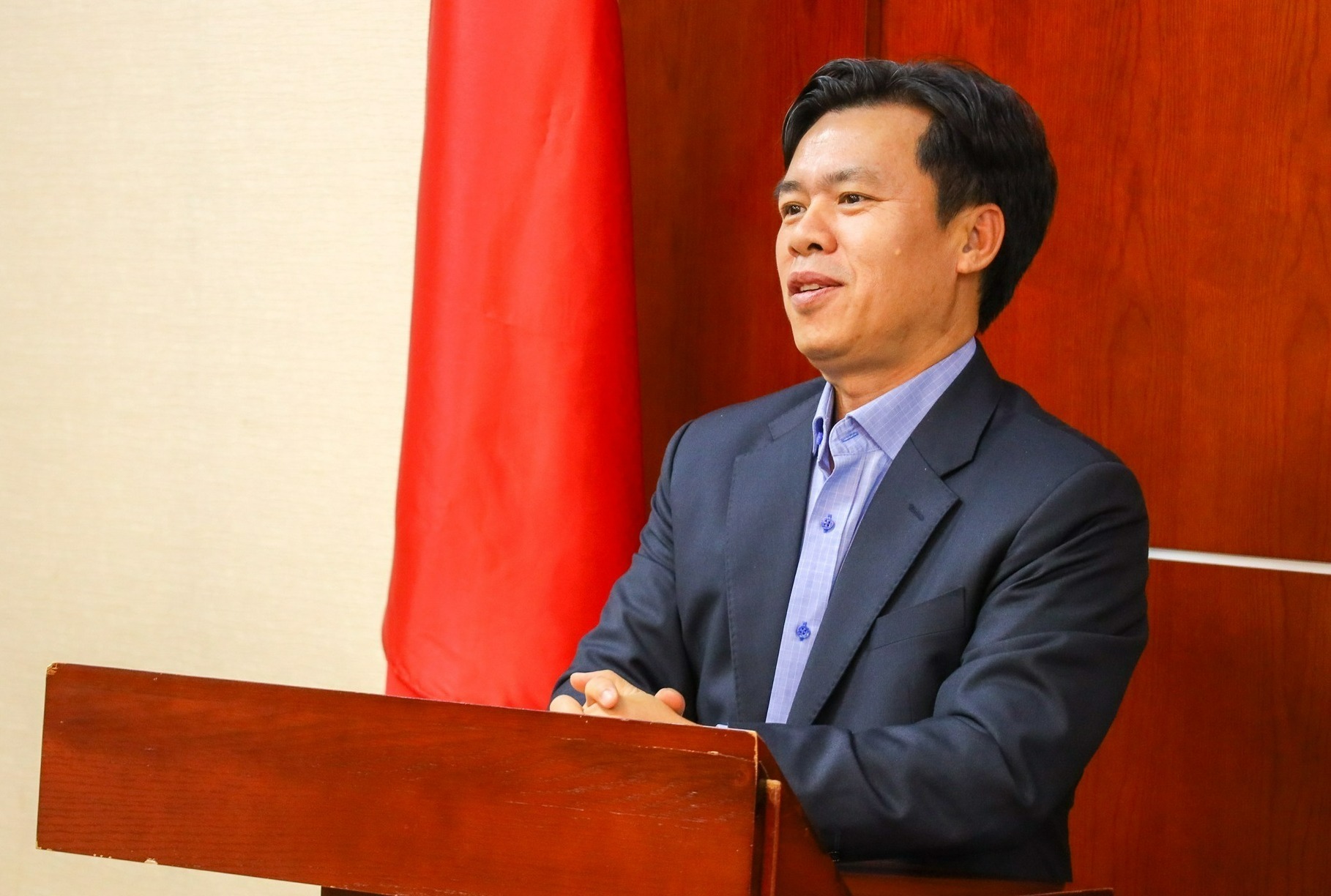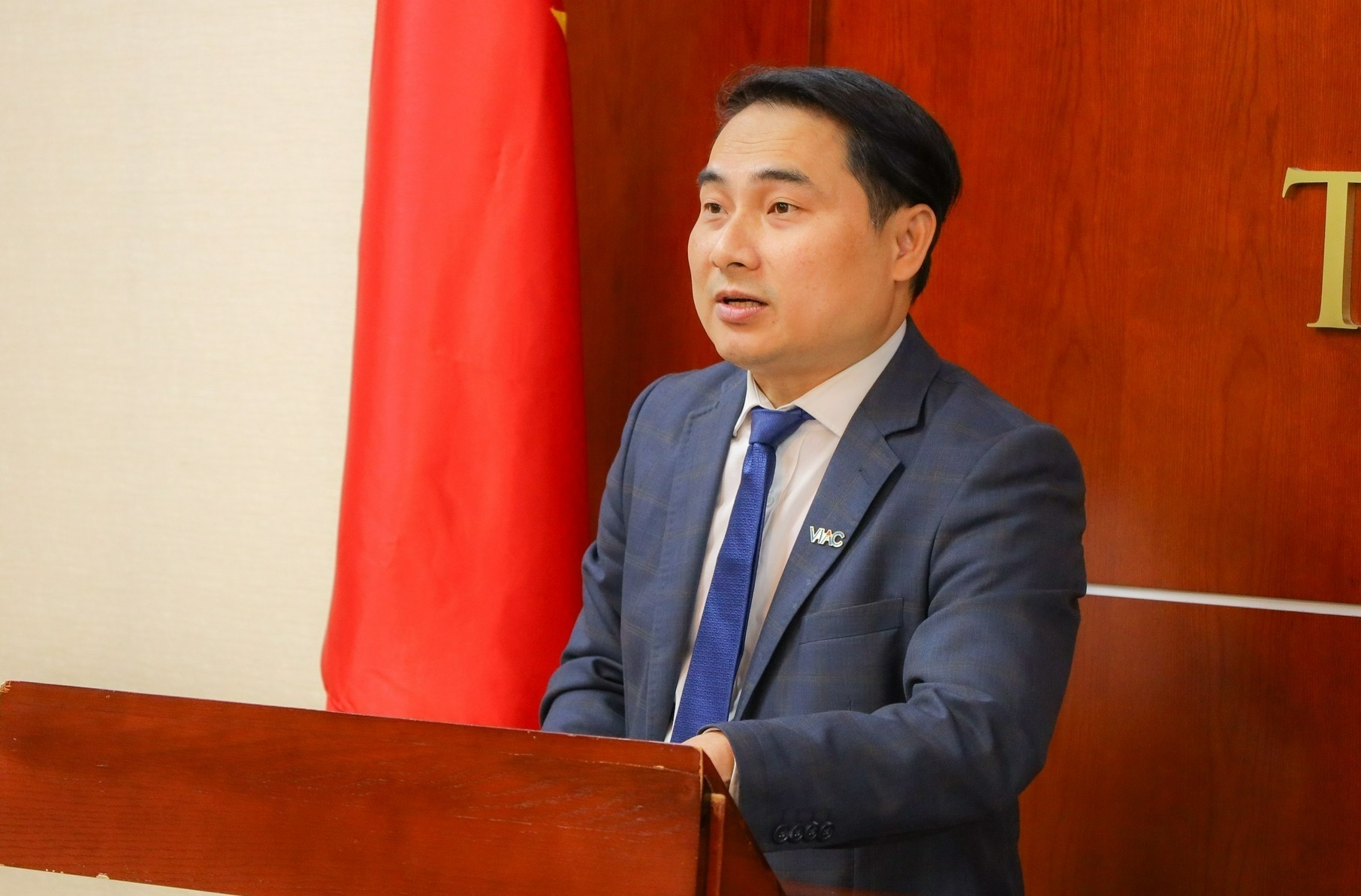Speakers at the event
On the morning of March 22, 2024, in Ho Chi Minh City, the Vietnam International Arbitration Center (VIAC), in collaboration with Ho Chi Minh City University of Law (ULAW), successfully organized a specialized workshop titled "Emergency interim measures in arbitration proceedings and the impact of third parties". The workshop attracted nearly 100 in-person attendees, including lawyers, lecturers, and interested students, along with over 200 online participants.

At the opening of the workshop, Assoc. Prof. Dr. Tran Viet Dzung – Vice Rector of Ho Chi Minh City University of Law, had a welcoming speech. Dr. Dzung stated that arbitration, with its advantages as an alternative dispute resolution method, has become more familiar to the business community in the process of integrating into the global economy. Alongside this growth, arbitration proceedings have become increasingly complicated, especially with the involvement of third parties. Arbitration, by nature, is a “private” method of dispute resolution tied to the arbitration agreement between the parties; therefore, issues related to ensuring and harmonizing the rights and interests of third parties remain inadequately addressed in practice. Among these issues, emergency interim measures involving third-party factors is considered as such an important matter. Dr. Dung expressed that the seminar, with its open and constructive academic atmosphere, would lay the groundwork for legal experts to conduct further in-depth research and contribute to the development of Vietnam's legal framework on commercial arbitration.

Prof. Dr. Do Van Dai - Vice Rector of Ho Chi Minh City University of Law
Following Assoc. Prof. Dr. Tran Viet Dung’s remarks, Prof. Dr. Do Van Dai - Vice Rector of Ho Chi Minh City University of Law, shared insights with the workshop’s participants. With extensive experience in research, teaching, and handling various disputes, Prof. Dai highlighted some of the bottlenecks and challenges in Vietnamese arbitration law, particularly regarding emergency interim measures (EIMs) and the rights and obligations of third parties in the arbitration process. According to Prof. Dai, a notable advance of Law on Commercial Arbitration 2010 stipulates the power of arbitral tribunal to apply EIMs which was not previously provided by the Arbitration Ordinance. However, LCA places limitations on types and scope of interim measures applied in arbitration proceedings, which leads to many disadvantages for arbitration in comparison with the court. Specifically, Prof. Dai cited examples where arbitration councils’ limited authority compelled parties to file applications with courts for EIMs, often leaving arbitration more restricted than court proceedings. To illustrate, Prof. Dai cited examples where arbitration councils’ limited authority compelled parties to file applications with courts for EIMs, potentially undermining the urgency and increasing delays for the parties involved. Prof. Dai expressed his hope that the seminar would foster diverse and practical discussions, contributing to the improvement of the regulations governing the types and scope of EIMs in arbitration.

Mr. Chau Viet Bac, Vice Secretary-General of VIAC
Representing the Vietnam International Arbitration Centre (VIAC), Mr. Chau Viet Bac, Vice Secretary-General of VIAC, noted that over more than 13 years of law application, with the increasing quantity and complexity of disputes, Law on Commercial Arbitration 2010 has revealed several inadequacies that significantly impact the settlement processes of arbitral tribunals and arbitration institutions. Issues related to applying emergency interim measures (EIMs), particularly when involving third parties, are still controversial. Mr. Bac observed that for EIM requests impacting third parties, to ensure compliance with the principles and spirit of arbitration law, parties are often advised or choose to submit these requests to the courts. Although this approach currently does not overly affect the arbitration dispute resolution process, it can, to some extent, lead to delays and potentially diminish the appeal and effectiveness of arbitration. Consequently, discussions and proposals aimed at improving Law on Commercial Arbitration 2010, especially concerning these issues, are necessary.
Mr. Huynh Quang Thuan, Lecturer of the Civil Law Faculty at Ho Chi Minh City University of Law |
| Ms. U Thi Bach Yen, Former Judge of the Economic Court of the Ho Chi Minh City People’s Court, Arbitrator at VIAC |
Mr. Nguyen Trung Nam - Senior Partner of Denston Luat Viet and VIAC arbitrator |
| Dr. Nguyen Thi Hoa - Lecturer of the International Law Faculty at Ho Chi Minh City University of Law |
From the perspective of Vietnamese Law: Decisions to apply emergency interim measures by arbitral tribunal and impacts on non-party parties
Starting off the presentations, Mr. Huynh Quang Thuan, Lecturer of the Civil Law Faculty at Ho Chi Minh City University of Law, shared his insights on the topic “From the perspective of Vietnamese Law: Decisions to apply emergency interim measures by arbitral tribunal and impacts on non-party parties". Mr. Thuan provided an overview of the role of emergency interim measures (EIMs) in arbitral proceedings. In terms of arbitration law, Law on Commercial Arbitration 2010 currently does not clearly define EIMs, instead only listing the EIMs that arbitral tribunals may apply. Furthermore, regarding the jurisdiction of arbitral tribunals to apply EIMs, the law is still restrictive, meaning that beyond the measures listed in Article 49, Clause 1, arbitration tribunals are not allowed to implement other EIMs that they may consider appropriate for resolving disputes. This marks a distinction between Vietnamese law and the arbitration laws of some other countries. In terms of third-party involvement in EIMs, according to Article 49, Clause 1 of the LCA, arbitration tribunals can grant one or more EIMs to “the disputing parties”. This provision indicates that Vietnamese law takes the position that arbitration tribunals cannot apply EIMs to third parties who are not directly involved in the arbitration proceedings. Based on comparisons with laws from other countries, Mr. Thuan suggested that expanding the power of arbitration tribunals to apply EIMs to third parties would be inappropriate, as it would undermine the essential nature of arbitration as a dispute resolution method. However, this limitation does not eliminate the parties' right to request EIMs against third parties through court support. Addressing the potential impact of EIMs on the rights and obligations of third parties, Mr. Thuan analyzed the current Vietnamese arbitration law’s restriction on arbitration tribunals from applying EIMs to third parties. This, however, does not mean that EIMs applied by arbitration tribunals cannot affect the rights and obligations of third parties uninvolved in the dispute. Therefore, to protect third-party rights, if an EIM is found to infringe on a third party, it should be annulled. From his analyses and evaluations, Mr. Thuan provided several conclusions and recommendations, including the stance that the authority of arbitration councils to apply EIMs to third parties should not be recognized, and that EIMs should be annulled if they are found to infringe on third-party rights.
The role of courts in applying emergency interim measures by arbitral tribunals
Following Mr. Huynh Quang Thuan’s presentation, Ms. U Thi Bach Yen, Former Judge of the Economic Court of the Ho Chi Minh City People’s Court, VIAC's listed arbitrator, spoke on the topic “The role of courts in applying emergency interim measures by arbitral tribunals”. In her discussion, Ms. Yen compared the EIMs that courts and arbitral tribunals can apply, noting that tribunals face significant limitations on the types of EIMs they can issue. This restriction can result in delays for the parties involved and potentially leave urgent situations unresolved in time. Additionally, both courts and arbitral tribunals can apply similar emergency measures, but according to law, the requesting party can only seek an EIM either from the court or the arbitral tribunals, not both, unless the party seeks multiple EIMs that the arbitral tribunal does not have the authority to grant. Regarding EIMs involving third parties, Ms. Yen provided practices where parties requested EIMs affecting third parties in arbitral proceedings. In such cases, parties sometimes submit these requests to the courts to grant a decision on applying EIMs. EIMs which are often requested in practice, include “preventing third parties from altering the status quo of the disputed asset,” “requesting banks to temporarily halt L/C payments,” “freezing shares owned by the respondent in another company”. Under arbitration law, arbitral tribunals cannot issue EIMs to the non-disputing party, these requests should be submitted to the court instead. Through her analysis of legal regulations and practical applications, Ms. Yen recommended expanding the types of EIMs that arbitral tribunals are allowed to apply, clarifying Article 49, Clause 3 of the Law on Commercial Arbitration, and providing more guidance on the application of EIMs involving third parties in arbitral proceedings.
International experiences: Issues in applying emergency interim measures related to third parties and trends in international arbitration
Continuing the seminar, and to provide a comparative perspective on international trends versus Vietnamese law, Mr. Nguyen Trung Nam - Senior Partner of Dentons Luat Viet, VIAC's arbitrator, presented on “International experiences: Issues in applying emergency interim measures related to third parties and trends in international arbitration”. From an international law research standpoint, Mr. Nam referenced regulations from countries with a advanced arbitration systems, such as the UK, South Korea, and Singapore, to compare the approaches to EIMs involving third parties in Vietnam. According to Mr. Nam, there is inconsistency in determining whether the tribunals have the power to apply EIMs to third parties in arbitration proceedings. He proposed that Law on Commercial Arbitration in Vietnam should also be amended to allow arbitral tribunals to issue EIMs, after which one party could request the court to enforce these measures, like the approach in South Korea. This would enable EIMs issued by arbitral tribunals to be enforceable against third parties through national court's implementation.
Recommendations on enhancing regulations for third parties and expanding the compentence of arbitral tribunals
Following Mr. Nguyen Trung Nam’s presentation, Dr. Nguyen Thi Hoa - Lecturer of the International Law Faculty at Ho Chi Minh City University of Law, shared recommendations on enhancing regulations for third parties and expanding the jurisdiction of arbitral tribunals to apply emergency interim measures (EIMs). In her presentation, Dr. Hoa categorized the scenarios in which third parties may be involved in dispute resolution, identifying these cases as follows: (i) Third parties within the arbitration agreement; (ii) Third parties who intervene or are joined in arbitration proceedings; (iii) Third parties impacted by the arbitral award; and (iv) Third-party funding (TPF) providers. Dr. Hoa also presented several practical scenarios involving third parties and how arbitral tribunals and courts have addressed these situations. In some cases, third parties might not be considered “parties” in the dispute or could even serve as defendants or claimants in arbitration. Therefore, it is essential for arbitral tribunal to clearly determine the nature of any “third party” involved in the dispute to appropriately limit their authority and avoid having the award annulled for exceeding jurisdiction. Based on her analysis, Dr. Hoa made several recommendations to improve Vietnamese arbitration law concerning third parties. She proposed broadening the scope of arbitration agreements to bind third parties in certain cases and formally recognizing the legitimacy of TPF. Regarding the enhancement of arbitral tribunal jurisdiction to apply EIMs, Dr. Hoa noted that Vietnam’s arbitration law provides relatively flexible conditions for applying EIMs, as only one party’s agreement is needed (thus excluding third parties). However, beyond these supportive provisions, Article 49, Clause 5 of the Law on Commercial Arbitration imposes a significant liability on arbitral tribunals, holding them liable for damages if the EIM causes harm to the requesting party, the party affected, or any third party. Comparing this with international practices, Dr. Hoa noted that while other countries also stipulate liability for damages arising from EIMs, they assign this responsibility to the requesting party rather than to the arbitrator or judge. She suggested that this approach could be considered in Vietnam’s arbitration legal framework.
Following the experts' presentations, the discussion session was highly engaging, with numerous questions posed by participants. The experts and guest speakers provided thorough answers and shared valuable insights, fostering a dynamic exchange of ideas.
>>> EVENT MATERIAL: Please see here
-------------------------------------------
The specialized workshop "Emergency interim measures in arbitration proceedings and the impact of third parties" is the opening event for the Arbitration - Mediation Symposium 2024 (AMS 2024), organized by VIAC in collaboration with legal training institutions in Ho Chi Minh City. The series ran from March 22, 2024, to April 11, 2024.